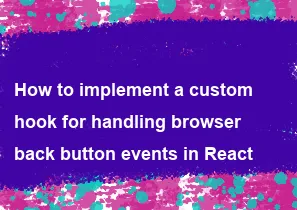How to implement a custom hook for handling browser back button events in React

To implement a custom hook for handling browser back button events in React, you can use the useEffect hook to add an event listener for the popstate event, which is triggered when the user navigates backward or forward in the browser history. Here's a basic example of how to create such a custom hook:
jsximport { useEffect } from 'react';
const useHistoryBack = (callback) => {
useEffect(() => {
const handleHistoryBack = () => {
callback();
};
window.addEventListener('popstate', handleHistoryBack);
return () => {
window.removeEventListener('popstate', handleHistoryBack);
};
}, [callback]);
};
export default useHistoryBack;
With this custom hook, you can easily handle browser back button events in your React components. Here's an example of how to use it:
jsximport React from 'react';
import useHistoryBack from './useHistoryBack';
const MyComponent = () => {
useHistoryBack(() => {
// Handle browser back button event
console.log('Browser back button pressed');
});
return (
<div>
<h1>My Component</h1>
<p>This component handles browser back button events.</p>
</div>
);
};
export default MyComponent;
In this example, whenever the user presses the browser's back button while this component is mounted, the callback function passed to useHistoryBack will be invoked. You can replace the console.log statement with any custom logic you want to execute when the back button is pressed.
-
Popular Post
- How to optimize for Google's About This Result feature for local businesses
- How to implement multi-language support in an Express.js application
- How to handle and optimize for changes in mobile search behavior
- How to handle CORS in a Node.js application
- How to use Vue.js with a UI framework (e.g., Vuetify, Element UI)
- How to configure Laravel Telescope for monitoring and profiling API requests
- How to create a command-line tool using the Commander.js library in Node.js
- How to implement code splitting in a React.js application
- How to use the AWS SDK for Node.js to interact with various AWS services
- How to use the Node.js Stream API for efficient data processing
- How to implement a cookie parser middleware in Node.js
- How to implement WebSockets for real-time communication in React
-
Latest Post
- How to implement a dynamic form with dynamic field styling based on user input in Next.js
- How to create a custom hook for handling user interactions with the browser's device motion in Next.js
- How to create a custom hook for handling user interactions with the browser's battery status in Next.js
- How to implement a dynamic form with dynamic field visibility based on user input in Next.js
- How to implement a dynamic form with real-time collaboration features in Next.js
- How to create a custom hook for handling user interactions with the browser's media devices in Next.js
- How to use the useSWRInfinite hook for paginating data with a custom loading indicator in Next.js
- How to create a custom hook for handling user interactions with the browser's network status in Next.js
- How to create a custom hook for handling user interactions with the browser's location in Next.js
- How to implement a dynamic form with multi-language support in Next.js
- How to create a custom hook for handling user interactions with the browser's ambient light sensor in Next.js
- How to use the useHover hook for creating interactive image zoom effects in Next.js